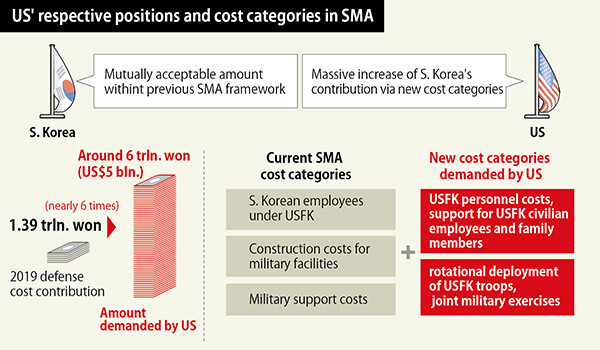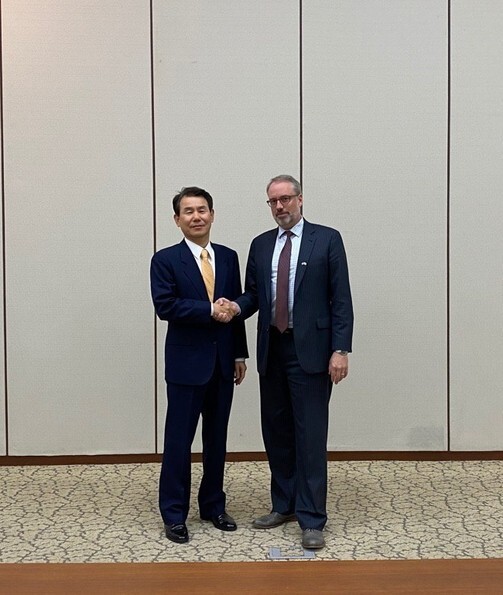hankyoreh
Links to other country sites 다른 나라 사이트 링크
[News analysis] US halts defense cost-sharing negotiations to increase pressure on S. Korea

The US’ lead negotiator in defense cost-sharing talks with South Korea cut short the negotiations on Nov. 19 and declared that South Korea’s “proposals [. . .] were not responsive to our request,” suggesting that the US’ demands are moving beyond pressure to the realm of extortion.
Going public with the negotiating breakdown can be seen as a calculated move to bring South Korea to its knees by fueling speculation about a crisis in the two countries’ alliance. Some critics see this as a heavy-handed approach to diplomacy that seeks to resolve problems through force rather than negotiations.
The claims made by James DeHart, the US State Department’s chief negotiator in the talks, were heavy-handed in several respects. “We cut short [. . .] the talks today in order to give the Korean side some time to reconsider,” DeHart said, adding that “we look forward to resuming our negotiations when the Korean side is ready to work on the basis of partnership.” These remarks serve as evidence that the US’ original goal in these negotiations was not to persuade the South Korean side but to simply have it sign off on certain concessions. DeHart’s remarks imply that Seoul is responsible both for the rupture in the negotiations and for seeing to their resumption.
“The US was deploying a scheme it had planned in advance. It deliberately brought the negotiations to a halt as a way to put pressure on South Korea,” said Cho Sung-ryul, a research consultant for the Institute for National Security Strategy.
The fundamental reason that the negotiations have broken down is because of the US’ excessive demands. The US wants South Korea to assume an obligation of US$5 billion, which is nearly six times what it’s paying this year. The US is insisting on the addition of categories of costs that haven’t appeared in previous versions of the cost-sharing agreement, known as the Special Measures Agreement (SMA). These categories include personnel costs for US troops, support for civilian contractors and their families, the cost of the rotational deployment of US troops to the Korean Peninsula, and the cost of exercises in other regions. The US argues that these are “American contributions” that hadn’t been calculated in past versions of the agreement, but even Americans are objecting that these categories seem to have been conjured up to provide after-the-fact justification for a previously determined amount.
South Korea is insisting that the cost of defense be divided in a reasonable and fair manner that upholds the framework of previous agreements. One of the cost-sharing standards that South Korea has reportedly indicated it would accept in the negotiations is the rate of increase in its defense spending, which will rise 7.4% year on year in 2020. That was the standard used in the 10th version of the agreement, concluded early this year. The government reviewed several indicators, including the rate of inflation and the GDP growth rate, but apparently concluded that the rate of increase of defense spending was the highest of these.
“Our goal in the negotiations is to set an appropriate rate of increase inside the current agreement structure,” Vice Defense Minister Park Jae-min told the National Assembly on Tuesday.
The US has marshaled various officials in an attempt to somehow plug the gap between the two sides’ positions.
“I was taken aback when US Ambassador to South Korea Harry Harris called me to his residence on Nov. 7 and repeated the demand for US$5 billion in defense funding about 20 times,” said Bareunmirae Party lawmaker Lee Hye-hoon, chair of the National Assembly’s Intelligence Committee. This incident reveals the US’ intransigence and urgency.
After attending South Korea and the US’ Security Consultative Meeting (SCM) on Nov. 15, US Defense Secretary Mark Esper described South Korea as a “wealthy country” and emphasized the importance of reaching an agreement by the end of the year that would increase South Korea’s share of defense costs.

Experts argue that the US’ approach doesn’t take into account its own interest in the alliance. By forcing South Korea to shoulder a much larger share of the defense burden, the US hopes to forestall any resistance from other allies. The US is reportedly asking Japan to pay US$8 billion, four times its current contribution, in negotiations for the latest version of their cost-sharing agreement, which is set to end in March 2020. The US is also pushing NATO member states to significantly increase their defense contributions. This is giving rise to suspicions that the US’ alliances are becoming transactional, rather than being based on shared interests and values.
It’s also noteworthy that the US’ pressure on South Korea to pay more for defense is intensifying as the announced termination of South Korea and Japan’s information-sharing agreement, the General Security of Military Information Agreement (GSOMIA), draws closer. Some think that the US is attempting to rattle the South Korean populace and manipulate public opinion by fueling claims made in some quarters about a crisis in the South Korea-US alliance, aside from its efforts at the negotiating table.
“In the past, the slightest pressure from the US was enough to force the South Korean government to do what it wanted. But now that the South Korean government is sticking to principles, the US is resorting to obviously rash moves,” said Cho Sung-ryul.
By Yoo Kang-moon, senior staff writer, and Park Min-hee and Kim Mi-na, staff reporters
Please direct comments or questions to [english@hani.co.kr]

Editorial・opinion
![[Guest essay] The real reason Korea’s new right wants to dub Rhee a founding father [Guest essay] The real reason Korea’s new right wants to dub Rhee a founding father](https://flexible.img.hani.co.kr/flexible/normal/500/300/imgdb/original/2024/0423/8317138574257878.jpg) [Guest essay] The real reason Korea’s new right wants to dub Rhee a founding father
[Guest essay] The real reason Korea’s new right wants to dub Rhee a founding father![[Column] ‘Choson’: Is it time we start referring to N. Korea in its own terms? [Column] ‘Choson’: Is it time we start referring to N. Korea in its own terms?](https://flexible.img.hani.co.kr/flexible/normal/500/300/imgdb/original/2024/0423/3617138579390322.jpg) [Column] ‘Choson’: Is it time we start referring to N. Korea in its own terms?
[Column] ‘Choson’: Is it time we start referring to N. Korea in its own terms?- [Editorial] Japan’s rewriting of history with Korea has gone too far
- [Column] The president’s questionable capacity for dialogue
- [Column] Are chaebol firms just pizza pies for families to divvy up as they please?
- [Column] Has Korea, too, crossed the Rubicon on China?
- [Correspondent’s column] In Japan’s alliance with US, echoes of its past alliances with UK
- [Editorial] Does Yoon think the Korean public is wrong?
- [Editorial] As it bolsters its alliance with US, Japan must be accountable for past
- [Guest essay] Amending the Constitution is Yoon’s key to leaving office in public’s good graces
Most viewed articles
- 1Senior doctors cut hours, prepare to resign as government refuses to scrap medical reform plan
- 2[Column] ‘Choson’: Is it time we start referring to N. Korea in its own terms?
- 3Why Korea shouldn’t welcome Japan’s newly beefed up defense cooperation with US
- 4Opposition calls Yoon’s chief of staff appointment a ‘slap in the face’
- 5[Guest essay] The real reason Korea’s new right wants to dub Rhee a founding father
- 6[Editorial] Japan’s rewriting of history with Korea has gone too far
- 7New AI-based translation tools make their way into everyday life in Korea
- 8[Column] The clock is ticking for Korea’s first lady
- 9[Column] Has Korea, too, crossed the Rubicon on China?
- 10Terry Anderson, AP reporter who informed world of massacre in Gwangju, dies at 76